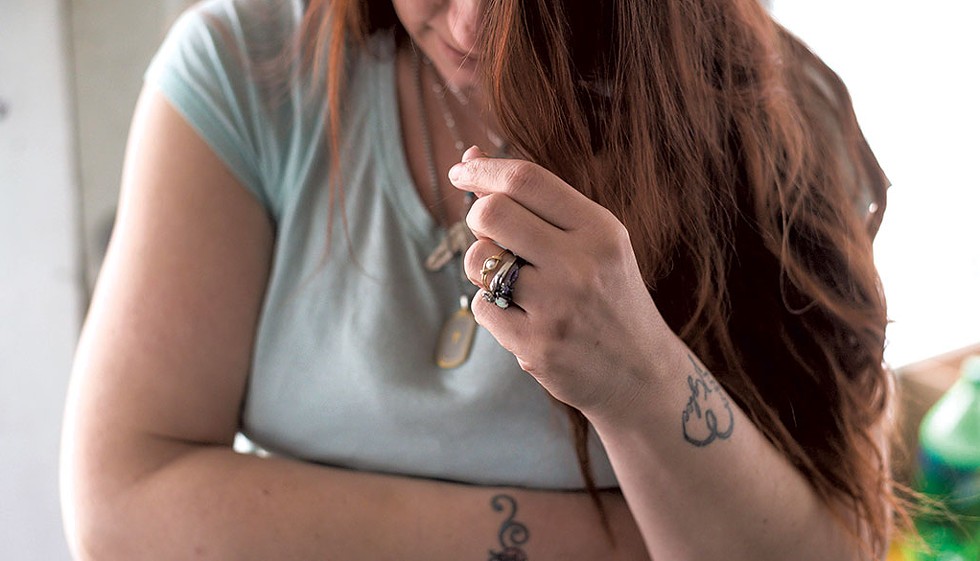
- Glenn Russell
- Suzanne
I was sitting at my kitchen table on a hot August afternoon in 2013 when I got a call from a number I didn't recognize. I answered, hoping that it was my sister, whom I hadn't talked to for several weeks. This wasn't entirely unusual — Maddie was addicted to heroin and would sometimes disappear for days or weeks. As always when I hadn't heard from her, I was worried.
But it wasn't my sister's voice I heard on the line, it was a man who introduced himself as a Brooklyn police detective. I paced as he explained that my sister had been arrested. She was safe, he assured me, though withdrawing from heroin. He emphasized that I needed to pick her up as soon as she was arraigned. I needed to put her directly in a car and take her out of New York City.
He was vague when I asked what was going on, and I didn't bother asking my sister when he finally put her on the phone. I thought it was because she was dopesick that her voice sounded so flat, a slab of gray slate with a thin crack of despondence running through it. It wasn't until the next day when he called back that the detective finally explained his urgency: My sister had been sex trafficked by some "bad guys," and it wasn't safe for her in New York.
What I know of my sister's experience there is like scraps of paper snatched from the wind as they fluttered by, each one written on by a different hand. Maddie's trip was arranged by a woman she bought drugs from in St. Albans, though its purpose is unclear: Maddie told my mom at the time she'd be seeing a Broadway show. She told me later she thought she was going to make fake credit cards. She told our sister Maura that she was muling heroin.
After she'd been there for a week, she called her best friend and asked her to come get her. She said that when she got to New York everything had seemed fine, but now the men she was with were giving her drugs to make her stay. She didn't know where she was but said she'd call back soon with an address. A week later she called her friend again. This time she was frantic, screaming. She had grabbed a phone, run to the bathroom and locked herself inside. Her friend could hear pounding on the door as Maddie begged to be picked up, but my sister didn't know where she was.
The detective explained to me that Maddie had been held in a motel room by people who had taken her photo, posted it on a website used to advertise commercial sex, and coerced her into having sex with men who responded to the ad by withholding heroin and threatening her with withdrawal. She was arrested when the police pulled over her traffickers and found her in the car. They used the drug paraphernalia in her pocket as an excuse to arrest her: They knew she was in trouble.
Because there was a warrant out for Maddie's arrest, she was not released after her arraignment. Instead she went from being held captive in a motel room where she was forced to have sex with strangers to being jailed for six weeks at Rikers Island before she was extradited to Vermont. The first time I visited her at Rikers she cried as she told me she couldn't talk about what happened to her. "It was really, really bad, Katie," she said, and extended her arms to show where she had been burned with cigarettes.
Force, Fraud and Coercion
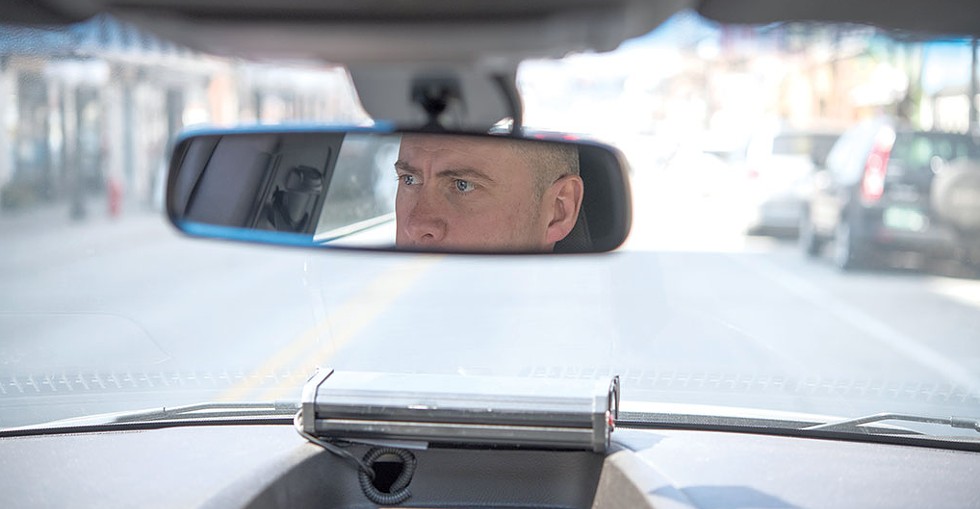
- Caleb Kenna
- Rutland Police Commander Matt Prouty
When I got that phone call six years ago, I thought sex trafficking was something that happened to people in other countries or to women who were brought to this country to work in massage parlors. I had no idea it was something that could happen to my sister. In part that's because I didn't understand what sex trafficking is.
The 2000 federal Victims of Trafficking and Violence Protection Act defines it as "a commercial sex act ... induced by force, fraud or coercion, or in which the person induced to perform such act has not attained 18 years of age."
What's the difference between sex trafficking and what's commonly referred to as prostitution? Force, fraud and coercion. Prostitution, also called commercial sex work, is when an adult voluntarily exchanges sex for money or something else of value. Sex trafficking is prostitution that an adult does not choose to participate in. Minors cannot legally consent to exchanging sex for something of value, whether that be cash, drugs, food or a place to sleep, so anytime a minor participates in commercial sex they're being trafficked.
Sex trafficking is happening throughout the United States, including in Vermont. "It's not just in Rutland, it's not just in Burlington and South Burlington," said Matt Prouty, a commander with the Rutland City Police Department. "It's happening in every community — rural, urban, you name it."
Trafficking Resources
If you believe you or someone you know is being trafficked in Vermont, call 2-1-1 to get help. If you are a trafficking victim, this will not trigger the involvement of law enforcement unless you want it to.
To contact the National Human Trafficking Hotline, call 1-888-373-7888 or text 233733.
If you or someone you know is in immediate danger, call 9-1-1.
Police, prosecutors and advocates I spoke with described the problem as "big" and "sizable," even "rampant" in the state, but I was warned that what little data there are don't reflect the scope of the problem; sex trafficking is significantly underreported. A federal grant application submitted last year by the statewide Human Trafficking Task Force shows that the number of victims who received services in Vermont jumped by almost 400 percent between 2015 and 2017, from 31 to 150 people. The number of sex trafficking investigations doubled in that same period of time, from 31 to 64. And the number of prosecutions nearly tripled, from two to seven.
One of the defendants was Diheim Young, who in 2016 became the first person to be convicted of sex trafficking in Vermont. Later this month, Brian Folks is expected to be the first accused sex trafficker to go before a Vermont jury. Folks has been charged with trafficking five adult women and one minor, though there are many more identified and unidentified victims, according to Abigail Averbach, who was the lead prosecutor on the case before leaving the U.S. Attorney's Office earlier this year.
Both Folks and Young were charged with sex and drug trafficking. Both allegedly used heroin to coerce girls and women into the sex trade. The definition of coercion includes "threats of serious harm"; two separate court cases in 2015 established that opioid withdrawal qualifies as serious harm.
"When somebody is withdrawing or detoxing from opiates," explained Aron Steward, assistant clinical director of Woodside Juvenile Rehabilitation Center in Colchester, "they are willing to do anything not to be withdrawing and detoxing from opiates," which makes them vulnerable to being trafficked.
"We have drug pushers that have figured out, 'Hey ... if females are addicted [to opioids] we can get control of them, and we can use them profitably to enter them into the sex trade,'" said Lance Burnham, a detective lieutenant with the Vermont State Police.
And the sex trade is profitable, "far more lucrative than drug trafficking," according to Cindy Maguire, an assistant Vermont attorney general. "It's a much better business model," said Averbach, a former assistant U.S. attorney in the state. "You can sell a bag of dope only one time, but you can sell a girl over and over and over again."
A Thin Line
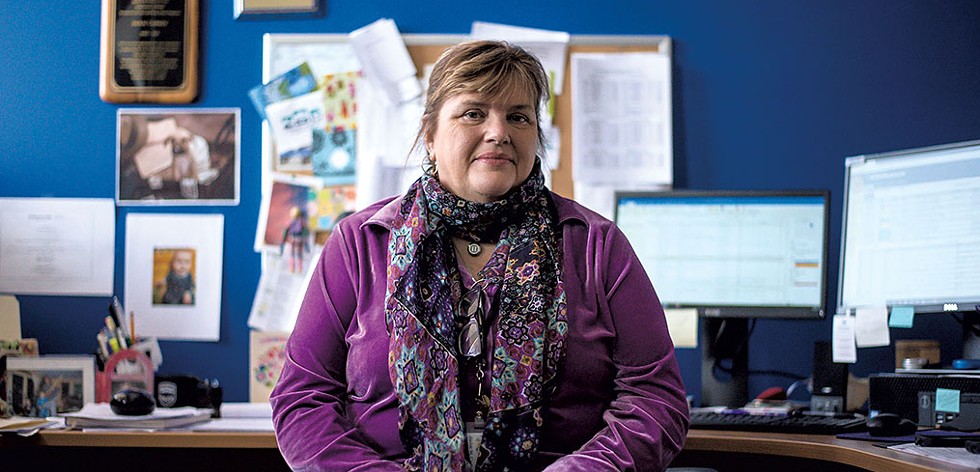
- Glenn Russell
- Jackie Corbally, Burlington's Opiate Policy Manager
On January 3, 2001, a Vermont teenager was found murdered in a Bronx apartment. Christal Jones, 16, was one of more than a dozen Vermont teenagers and women who had been brought to New York as part of what was described at the time as a "prostitution and heroin ring." No one was ever charged with Jones' death, but two people, Jose Rodriguez and Beverly Holland, were eventually convicted of running two separate businesses in which they lured girls and women from Vermont to New York to do commercial sex work. There is nothing to indicate that heroin was a part of Holland's operation, but the girls under Rodriguez's control, including Jones, did use heroin, and he was ultimately convicted of giving it to one of them.
Jones "was one of our really profound first exposures to this world" said Jackie Corbally, who worked with her in 1999 and 2000 at Spectrum Youth & Family Services and is now opioid policy manager with the Burlington Police Department. "She found herself in this horrible place ... and she didn't make it back. It was really new for Vermont, and ... there are times where the state has been really naïve."
What happened to Jones and more than a dozen other girls and women was seen as an anomaly; most Vermonters remained naïve about sex trafficking for more than another decade. The state was one of the last in the country to enact its own human trafficking statute, in 2011. Even then it did so not because there was a perceived problem — "the driving force was the fact that Vermont did not [yet] have a statute," according to Maguire.
"There's a thin line between prostitution and sex trafficking," a trafficking survivor told me. In the decade after Jones' death, Colchester Police Lt. Jim Roy would frequently run into situations that he said had "all the earmarks" of commercial sex work at area hotels.
At the time many viewed prostitution as a "victimless crime," according to Roy, a transaction between two consenting adults that, while illegal, wasn't hurting anyone. But this idea outraged him. He said he began having "heated conversations" about the fact that "there are victims all down the line of this." He described the signs of addiction he saw in women doing commercial sex work: "visible use marks ... veins just all full of puncture holes and blown out from injecting in spots."
"For a long time people were saying there is a choice involved," said Steward, "so it wasn't trafficking, it wasn't a chargeable offense. It was simply a job choice. And in Vermont ... people were just saying, 'It simply doesn't happen here.'"
When I asked Heather Ross, a former assistant U.S. attorney who prosecuted Young and served as the cochair of Vermont's Human Trafficking Task Force for three years, whether the problem had been overlooked or was just starting to explode in the past several years, she said, "Yes to both. I do think the opiate addiction crisis has created this horrible situation where people can be so easily controlled by their addiction because the addiction itself is so powerful. But do I also think we were missing it? Yes. I think ... it was happening, and we were not aware."
If any of the women Roy encountered were being trafficked, they weren't reporting it. But the crime is rarely reported. Most people who experience it aren't even aware of what sex trafficking is, let alone that it's happening to them. The language they use to describe their experience is the lingo of commercial sex — the life, the game, hustling, going on dates. They see themselves as prostitutes, not victims of sex trafficking.
"Somebody is trafficked over a period of time," Averbach explained, "so you're not getting raped, beaten, burned, threatened each and every time you go out and commit a commercial sex act. You only really need to beat somebody one time. And the rest of the time, you can just threaten to do that again. And so it looks and starts to feel like choice." Some trafficking victims aren't raped, beaten or burned at all, making the line between trafficking and choice even more difficult to see.
Stigma is also a barrier to reporting. "The shame is so great," said Ross, who now works in private practice in Burlington. "I encountered so many victim survivors who felt as if because they had made some bad choices" — using drugs, for example — "therefore everything that happened to them they thought they were responsible for, no matter how bad ... They've normalized the experience, they're ashamed of the experience, they feel guilt. That's all part of the traffickers' manipulation as well."
Because sex trafficking is not reported, it must be discovered, and because no one was looking for it in Vermont in the decade after Christal Jones' death, no one was finding it.
'Something Didn't Seem Right'
In 2011, the same year Vermont finally passed its statute, then-assistant U.S. attorney Ross got what is referred to as a "duty case" — federal prosecutors rotate who is on duty to respond to situations that need immediate attention, and Ross happened to be on call when law enforcement came across a car pulled over on the side of a Vermont road. The driver said he was trying to find a farm and had gotten lost. His passenger, a woman in her thirties, was undocumented and had a conviction for prostitution in her home country. She had no idea where she was.
"Something about this even in 2011 didn't seem right," Ross said.
An investigation revealed the driver had brought the woman up from New York City to perform commercial sex work with laborers at farms. That particular case was ultimately not prosecuted as sex trafficking, but Ross and assistant AG Maguire decided to reconfigure the task force that had originally been established to create a human trafficking statute. They invited law enforcement, including Prouty and Burnham, to join, and they focused on training police working in the drug world.
"We did that because we already had the infrastructure in place," said Maguire. "We had cops on the street that were very eager to do drug work." Police were trained to look at drug scenes differently, to recognize that "if there's a woman present ... they are likely to be a trafficking victim."
Burnham, who had been in law enforcement for 14 years when he was appointed to the task force in 2013, said that he "didn't know what [sex trafficking] was, didn't know it existed." He had risen through the ranks working in the state's criminal division, where he'd handled sexual assault and child abuse cases in the special investigations unit. When he walked into his first meeting with the task force, he was thinking, "We don't have this problem in Vermont, I know nothing about this, I would have heard about this ... It's not something I want to waste my time with."
He left feeling "overwhelmed. I didn't know the issue was as bad as it was. It was an eye-opening experience, to say the least."
"There was a lot of educating about what human trafficking looks like and how people can be controlled through their addiction and that control and force and fraud and coercion [are not] that old-fashioned view of someone locked up in a basement," said Ross. "There are many, many other ways to control people."
"When I wasn't looking for it, I didn't realize it was a problem," Prouty said. "As I started to educate myself ... the light bulb went on. Then all of a sudden I'm seeing it everywhere."
A Federal Case
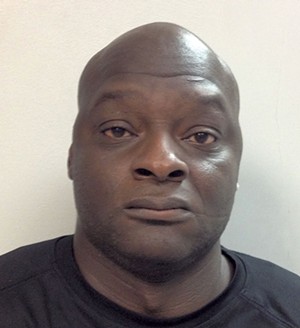
- Courtesy Of Burlington Police Department
- Brian Folks
I didn't interview any of the women Brian Folks is accused of sex trafficking, so I can't tell you what they look like, where they grew up, whether they have kids. I don't even know their names; court documents identify them by numbers and letters — Victim 1, Minor Victim E — or initials. But after reading those documents I can tell you some of what law enforcement saw when it finally started looking.
Everything that follows is either summarized or taken verbatim from documents filed in the Folks case, including affidavits from law enforcement officers. Everything here is alleged to have happened; Brian Folks pleaded not guilty to all of the charges against him and has not yet gone to trial, let alone been convicted. Folks' lawyer had no comment for this article.
From June 2012 through March 2016 Folks allegedly ran a pair of "separate, yet intertwined illegal businesses" in Burlington. One was a prostitution business; the other sold heroin and crack. Women who worked for Folks' prostitution business often worked for his drug business, as well, bagging or moving drugs.
In 2012, Victim 4, who was 17 and homeless, fell in love with Folks and soon started having sex with him. When she first heard that Folks prostituted women and sold drugs, she didn't believe it, but when she needed money and asked Folks for help, he took photos of her in her bra and underwear and posted them on Backpage, a website that at the time was used to advertise commercial sex. While at first Folks let her have half the money she made, he eventually began keeping it all.
Victim 1 met Brian Folks in May 2015 and immediately began working for his drug business. Among other duties, Victim 1 said she and other women bagged heroin and crack, which Folks would sometimes demand that they do naked or in their underwear.
Several months after she began working for his drug operation, Folks suggested to Victim 1 that she work for him as a prostitute. She wouldn't at first, but eventually Folks refused to give her heroin, and when she started to become dopesick, he took her to a hotel where she "had her first 'date' as a prostitute." Afterward, Folks picked her up, took more than half of what she had been paid and let her have heroin. After that, Folks, "supplied her with a steady stream of heroin ... in what appeared to be an effort to keep her compliant."
Victim 2 was already doing commercial sex work when she met Folks, who responded to her online ad. At their first "date," Folks asked Victim 2 if he could pay her using heroin instead of money, and she agreed. Folks became her dealer, and she paid him for drugs with cash or sex. Folks asked Victim 2 to work for him as a prostitute, but she refused until she was dopesick. Folks tried to withhold drugs until she'd had her first "date" working for him, but after Victim 2 protested he provided her with a small amount of drugs and promised to give her more afterward.
At a trailer in Colchester, Folks used his phone to take "sexually suggestive" photos of Victim 2 and posted them on Backpage. After receiving a response, he drove Victim 2 to the parking lot of the Staples in South Burlington, where she had sex with the man who had responded to the ad in exchange for $100.
Folks allegedly prostituted dozens of women, some through force, fraud or coercion. Once he'd recruited them, he'd post photos of them on Backpage. He kept track of the money they earned and took some or all of it.
If they didn't want to do commercial sex work, Folks forced some of them to, using threats of and actual physical and sexual violence and by withholding the heroin they were addicted to.
He created a "climate of fear" that involved extorting and blackmailing women by threatening to post sexually explicit photos of them online, and then actually doing so, as well as forcing them to have sex with him and his friends before he would let them have heroin. Women who refused or broke his rules were "violated" by Folks — his term to describe punishment.
When one of the alleged victims stole five bags of heroin, Folks told her she was lucky he didn't kill her and that she'd have to "work off" what she'd taken. He drove her to a cemetery near Riverside Avenue in Burlington, where he gave her heroin and forced her to have sex with him next to a dumpster.
Folks made videos in which he "coerced women to engage in humiliating conduct as a method of degrading them in order to further control them." In one video series which, according to court documents, Folks called "That's my bitch you're violating," he urinated on two of his drug workers. In another video he announced, "'I'm just pissing on bitches, man, I'm gonna see how far I can go.'"
I don't know who these women are. I don't know if they have brown hair or blond, if they like to stay inside on rainy days and binge-watch Netflix or go out without an umbrella and feel the rain on their skin. What I do know is that they are not what you just read; they are not what is in those court documents. That is who Folks is alleged to be.
If convicted of sex trafficking, he could spend the rest of his life in prison.
Trial and Errors
Folks and Young aren't the only men charged with sex trafficking in Vermont. Timothy Galloway was convicted at the state level. And Naquan Bowie, Anthony Smith, Gary Delima and Sharif Cargo were all charged with sex trafficking but ended up pleading guilty to or being convicted of other crimes, usually drug- or gun-related. Prosecuting sex trafficking cases is challenging, for myriad reasons.
"It takes a long time for these cases to play out," said Averbach, "and in that year or so that it takes to get from charging to verdict, people relapse, people die, people leave the state, people are trafficked again, they become homeless, we lose them." Not only that, testifying can be "retraumatizing" for victims. As a result, prosecutors sometimes allow perpetrators to "plead to something like a drug crime or a firearms count ... that doesn't depend on the victim taking the stand and exposing all of the trauma that happened to her," said Averbach.
Even in a best-case scenario when a victim is willing and able to testify, "Our legal system generally, and our criminal justice system in particular, is not very conducive to understanding how trauma impacts someone," said Ross.
For example, juries are instructed to judge the credibility of a witness. Someone who has been sex trafficked "typically doesn't recall information in a linear fashion," according to Ross; instead they remember "snatches" of what happened to them. "Our justice system historically has told us that if someone can't give you a story from A to Z, [if there are] inconsistencies in their story, [that] suggests that they're not credible. Well, that doesn't really match with what we know about how trauma affects people and their ability to recall and recite what happened to them."
It's been three years since Folks was initially arrested, seven since his first victim was allegedly trafficked. The case has been delayed numerous times and is on its fourth trial date, which is April 23. Victims and witnesses have died.
A significant delay occurred when one of Folks' lawyers withdrew from representing him. To protect witnesses in the case from being publicly identified, a protective order states that Folks, who is in prison, is "not to be left alone with" the government's witness list, among other materials. But the lawyer inadvertently mailed Folks a copy of the list, which includes the names of his victims. Folks then sent the list to his wife, and it was subsequently photographed and posted on Facebook, according to statements in a court transcript.
"The only purpose of disseminating the list such as this is to quiet these witnesses, to intimidate them, to harass them, and to not cooperate with the government and not be able to testify at trial," Averbach argued during a hearing on the matter.
The judge at the hearing apparently agreed, chastising Folks' then-lawyer: "This is how people get murdered, right?"
'I Owed Him'
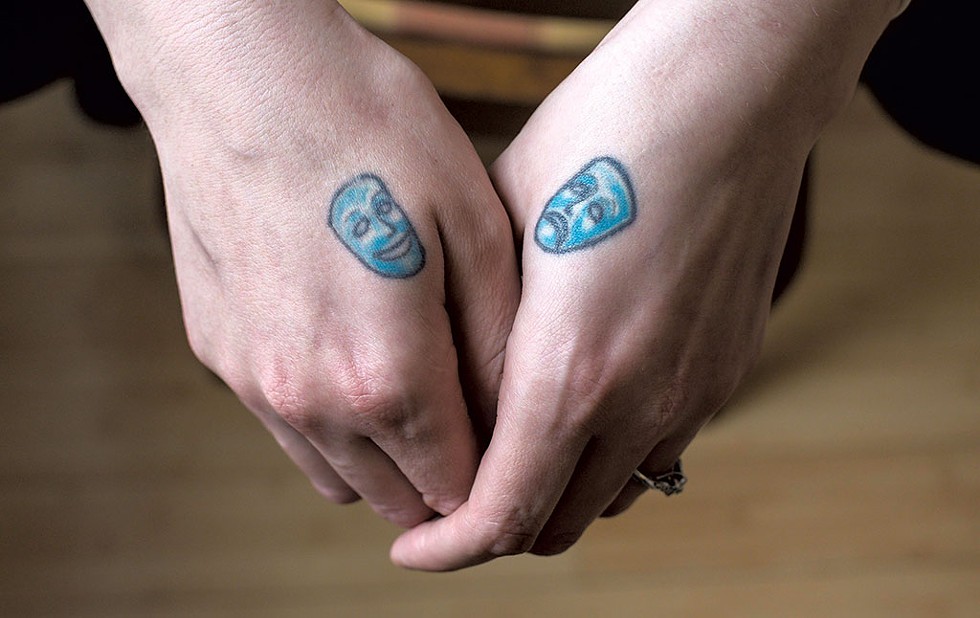
- Glenn Russell
- Kathleen
Sitting in my living room with her baby sleeping in a car seat beside her, Kathleen told me she was sure her trafficker was going to murder her when she left him, how he would sit in the parking lot of the clinic where she got her methadone, just out of range of the security cameras, and point a gun at her. "The message was basically come back or die," she said.
Kathleen (not her real name) is tall, her dark red hair pulled into a thin ponytail, with icy blue eyes set deeply in their sockets. It's easier to imagine her at the wheel of a station wagon driving her daughter to the grocery store than walking "the strip" in the small southern city where she was trafficked eight years ago.
When I asked Kathleen if she had any happy memories from childhood, she said no: Her father and stepmother physically and emotionally abused her. She moved to Vermont to live with her mother and sister when she was a teenager, then back south, where she joined the Marines. During boot camp she discovered she was pregnant and had to leave.
"I was happy to be a mother," she said, but she had envisioned raising her son with his father, and they separated after he cheated on her before the baby was born.
Through mutual agreement, her son went back and forth between Kathleen and her ex's house. She'd had a drinking problem since she was a teenager, but she didn't get drunk when her son was with her. However, because of her drinking, her ex was granted primary custody when her son was 4 years old; Kathleen was allowed to have him every weekend. Soon her ex stopped permitting weekend visits, and then he disappeared. After several days of being unable to reach him, she went to his house: "I'm banging on the door," she said. "I looked through the windows and everything's gone. My son was gone, [my ex] was gone, everything was gone."
After a couple of months of not being able to locate her son, she started using hard drugs, "mostly cocaine," Kathleen said. Since her son was born, she had been living a stable life in the small county where she grew up. But after he disappeared, "I couldn't stand looking at everything without my son there," she said, and she moved to a small city 90 miles away.
There her drug use worsened, though she didn't use opioids until she injured her wrist in a car accident and a doctor prescribed her oxycodone. "He didn't even give me an MRI," she recalled, "just prescribed me this opiate." He continued to prescribe it until she showed up for her appointment one day and found "yellow tape everywhere. The doctor had been shut down because he'd been illegally prescribing."
By then she was addicted, though she hadn't realized that was why she got sick when she didn't take the pills, that she was starting to withdraw. "I knew that I had a drinking problem," she said, "but I didn't think that the drugs were a problem." She started buying oxys illegally, and when she lost her job and then her apartment, a dealer offered her pills and a place to stay. It was all free at first, "but I owed him," she said. After a couple of weeks, when he told her she needed to pay back her debt, she had no other choice but to do what he asked. "I didn't have anywhere else to go," she said. The dealer rented all of the apartments in one building, out of which he ran his businesses — drugs and prostitution. The 10 to 15 women who worked for him at a time stayed in one apartment and worked out of another that Kathleen called the "brothel."
Her trafficker told Kathleen that she was too good for prostitution, that she could leave anytime she wanted. "He was like, 'Hey, if you ever want to stop, you just let me know and I won't sell you anything else and you can get out of the life on the spot.'
"I legitimately believed that everything was my choice," she said, though there were "red flags." The women were regularly beaten for breaking the rules, of which there were many, including quotas they had to meet. They weren't allowed to buy drugs from anyone but the trafficker. He took all of the money they made, except for a few dollars here and there to buy food. She still thought she could leave if she wanted to and that the other women were choosing to be there as well, though she never saw anyone try to go.
"He made it seem like he cared about our lives," Kathleen said. "Like, 'Nobody will care for you more than I will.'" And at this point Kathleen didn't care about her own life. "Drugs were the only thing I lived for," she said. "I was hoping that I would die at some point. I wanted it to end, I wanted to die without my son, without having a purpose. I didn't care about myself anymore."
For 10 months Kathleen worked for her trafficker, having sex with buyers she met on the strip or who responded to an ad on Backpage. And then she learned that her son and his father were living not too far away; she had a reason to live. "I wanted to clean up," she said, "and I wanted to be part of my son's life again if at all possible."
At that point, "I felt like I could never leave, I was afraid to, but because he told me I was allowed to, I decided to try it." One of her customers had told her that if she ever wanted to get out of the life she could come and live with him. She paid her trafficker the $20 she owed him and even gave him a tip, and then told him she was leaving.
"He took out a nightstick in front of the other girls and beat me from head to toe," she said. "I ripped three toenails off trying to get away from him. He split my head open." And then he locked her in a room in the apartment they called the brothel; he cleaned her wounds; he apologized for beating her; but "he told me it was for my own good and that I needed to stay in line now." For two weeks he kept her locked in that room, but he didn't leave her alone there. He would bring customers to the room and force her to have sex with them, and in between "he would give me small amounts of substances to get me through."
Two weeks later, he let her out of the room thinking she had learned her lesson and sent her out on the strip. When she recognized an undercover cop, she saw an opportunity and propositioned him to get herself arrested. After she was released from jail, she got on methadone and went to live with the customer who said he would take her in. When her trafficker continued to stalk her, she started a rumor that she was dead and moved back to Vermont.
'No Other Choice'
What happened to Kathleen bears some similarities to sex trafficking cases in Vermont. But people I spoke with cautioned me that there is no "usual way" trafficking occurs, in Vermont or anywhere.
"Every single case looks different," said Steward of Woodside.
While most known cases involve women, men are trafficked as well.
Children are also victimized. Between 2014, when officials began tracking these data, and 2018, the Department for Children and Families received more than 125 reports that involved children being sex trafficked. DCF does not track whether opioids played a role in those cases, but I was told "anecdotally" that drugs are more likely to be a factor with younger children, ages 6 to 9, who are being trafficked by their parents or other caregivers, possibly to support an opioid addiction.
Seven Days has also reported on Vermont massage parlors that offer illegal sexual services and whose employees are likely victims of trafficking, but where opioids are usually not involved.
If there is one thing sex trafficking cases have in common, it is that they are usually invisible. Even after I thought I understood what trafficking looks like, how insidious it can be, I didn't see it when it was right in front of me.
Suzanne (not her real name) was one of the first people I spoke to for this story. She told me she hadn't been sex trafficked, and I agreed with her until weeks later, when I played a recording of our interview. As her soft, hoarse voice unspooled in my kitchen one night, I heard what I had missed when we first talked.
I met Suzanne on a wintry Sunday afternoon after she'd gotten home from church. We had planned to get together several times, but Suzanne had canceled repeatedly. She messaged me as I was on my way to meet her that afternoon saying she was so nervous she felt sick but that I should come anyway. When I arrived, she was waiting for me on the front porch.
Suzanne cries easily, but she smiles easily, too, and when she does she covers her mouth with her hand to hide the fact that she's missing her front teeth, which were knocked out by an abusive boyfriend. If you walked by her on the street and didn't know her, you probably wouldn't notice her. But when you're sitting across from her listening to her talk, you don't want to leave.
When Suzanne was 13 years old, she sneaked out of her family's Franklin County home and went to a party, where she got drunk and stoned for the first time. All night she resisted a 19-year-old guy who was coming on to her. "I kept saying, "'No, no, no,'" she told me, but he had sex with her when she passed out. She got pregnant and had her first baby when she was 14 years old.
"For two years I did it all on my own," Suzanne said. "School, daycare, homework, school, daycare, homework, and then I tried working as well, and that didn't work." When she was 16 it "all came crashing down." She had what she described as a nervous breakdown that started with an anxiety attack, during which she was sure she was dying. She dropped out of school and left her daughter in her mother's care.
"I just wanted to experience life," she said, "but I did it wrong by partying and using." For a year straight she smoked crack. "And then one day I had enough and I called my mom, and she came and got me." Back at her mom's house, she slept for days.
For the next several years Suzanne stayed away from hard drugs. She got married, had a second and third child, left her husband. But she lost custody of her kids for reasons unrelated to drug use, and "that's when things got bad," she said. "I failed as a mom and that's the only thing I wanted in life." She soon started taking opioid-based painkillers, which "just made me feel so much better," she said. "Drugs were like an antidepressant for me. They made me numb, and I didn't have to think about anything." She worked long hours at a job she liked, and while opioids make some people sleepy, they helped Suzanne to stay awake.
As her habit worsened, she went to rehab at Maple Leaf Farm and tried medication-assisted treatment when she got out, but the clinic required that she attend three group sessions a week, which didn't work with her job. She went off her medication and "ended up relapsing, of course," she said.
When she was 25, she started dating a man named Harold and went to live with him in upstate New York. "I thought he was the love of my life," she said, but he quickly became abusive. He knocked out her teeth, broke a bottle over her head. When Harold was sent to prison for a year on unrelated charges, Suzanne returned to her mother's house in Vermont. She now had an expensive opioid habit but no job to pay for it, so when a farmworker she knew told her he had friends who "needed someone," she started doing sex work at farms in Franklin and Addison counties.
"I went from farm to farm," she said, having sex with migrant workers; she made $700 a night "at least." At times Suzanne spoke almost affectionately about the men who bought sex from her, whom she called her "friends" and referred to as "good people." But "bad stuff" was happening as well: She cried as she described a customer holding a gun to her head. Another night a man she refused to have sex with attacked her and bit her clitoris so badly she had to go to the hospital, though she didn't report what happened because she didn't want the other men, some of whom were in the country illegally, to get in trouble.
Other women she met at farms had pimps who drove them and took a cut of what they made. There were some she thought were probably being trafficked, girls who were underage or whose drivers were gang members, who arrived in cars with out-of-state plates.
If Suzanne had a pimp, it wasn't a human; it was a pill. She started doing the sex work to support her addiction, but "I needed a lot of drugs to do that. Selling your body, the whole time you're pretty much killing yourself mentally, thinking about how worthless you are and how this is how your life is always going to be, this is all you're good for."
When Harold got out of jail, Suzanne wanted to stop working, but he "kind of enforced it," she said.
This is what I missed the first time I heard her story. This is what I didn't hear:
Suzanne wanted to stop working, but Harold "kind of enforced it because we needed the money. He said, 'Well, you did it while I was in jail; you can do it now. It's more important now.'" He was "not forceful like he was going to kill me over it, but enough to where I knew I had no other choice."
I think of Suzanne covering her smile with her hand to hide the missing teeth that Harold punched out of her mouth. Of her knocking on doors in the middle of the night in rural upstate New York trying to find help after he had beaten her up. Harold didn't have to hit Suzanne when he insisted she prostitute herself. Everything about her life with him showed her that when he made that demand, she didn't have a choice.
'Make It Stop'
When my sister died last fall, I described in her obituary the week and a half Maddie was home with our family a couple months earlier. What I didn't mention was that she had returned to Vermont from Rhode Island via a New Hampshire prison after being sex trafficked again. This time the cigarette burns were on her face, and she'd been burned on her feet, as well, with a curling iron, after she tried to run away.
When Maddie was trafficked in New York in 2013, there was very little awareness that sex trafficking existed in Vermont, let alone services to help people who had survived it. By the time she returned to Vermont last summer, the state's Human Trafficking Task Force had trained more than 2,000 individuals, including police officers, hotel staff, teachers and health care workers, to recognize signs of the crime. There was a human trafficking caseworker based out of the South Burlington Police Department. Since her position was created a year and a half ago, that caseworker has worked with 70 victims of sex trafficking, including my sister and Kathleen.
She helped Maddie enroll in medication-assisted treatment, set up her phone, find clothes. Together they developed a plan: As a condition of her release from the New Hampshire jail, Maddie was entering an outpatient program at Brattleboro Retreat. While she was there, the caseworker was going to help her apply to a long-term residential program outside of Boston for women who have been trafficked. She was experiencing intense post-traumatic stress disorder, she was craving drugs, she was heartsick over not being able to see her son, but she seemed hopeful.
There is now a second caseworker, in Rutland, dedicated solely to working with victims of human trafficking. Both of these positions were created by the Human Trafficking Task Force, which for the past nine years has operated essentially as an ad hoc group of volunteers. "We have no statutory authority, we have no budget, we are voluntary," said Maguire.
Last fall the group received a $1.2 million federal grant that will be used to hire three additional people to work full time on human trafficking in the state. "The focus has primarily been on education and awareness," said Maguire, but with this grant the focus will shift to "victim services and also a much more coordinated effort by law enforcement."
In Burlington the task force is currently "working with the mayor on a three-step housing solution," according to Averbach, which would comprise short-term, emergency beds for victims in crisis, an intermediate step of up to 30 days in which they can begin to stabilize, and long-term housing with wraparound services.
Equally important is helping survivors recover emotionally from what they've experienced.
After Kathleen was trafficked and moved back to Vermont, she started going by "Kathy." "I didn't want to be [Kathleen] anymore," she said. Her addiction intensified as she used drugs to cope with what happened to her. "I would have full physical flashbacks," she said, "and coming out of that I would need to use something just to make it stop." She began using heroin, while before she had only taken pills.
Six months ago, Kathleen's daughter was born while she was incarcerated at Chittenden Regional Correctional Facility in South Burlington. A week later they were reunited at the Lund Family Center in Burlington, where they now live. For the first time, Kathleen has been addressing the trauma at the root of her addiction. She's in therapy; she hopes to go to college in the fall; she's made herself a shield that hangs on her wall to remind her of her coping skills. And she has started going by Kathleen again. "I realized there was nothing wrong with [Kathleen]," she said. "She just needs a lot of help."
"We need to understand this is a form of trauma," said Corbally of the Burlington Police Department, "that trauma services need to be offered to these women. We need to recognize that this is a co-occurring issue," meaning that survivors of sex trafficking often have substance-use and mental-health issues that need to be treated in order to fully recover. "We're all after the same goal, which is to make sure women are safe and getting services, but we're doing it within the confines of a system that is not fully caught up to us," said Corbally. "It's really significant that the system catch up, because it's happening, it's out there, it's going on every single day."
Between the two times my sister was aware she was trafficked, she did sex work. Her boyfriend, who was physically abusive, relied on her to do that work to support their addictions. He also publicly shamed her for it on his Facebook page, posting that the mother of his son was a prostitute.
Traffickers don't just use violence or drugs to coerce their victims into having commercial sex; they manipulate their relationship with them. "The biggest form of coercion I have seen," said Matt Prouty, "is love."
In the weeks I've been working on this story, I've wondered if any of the nameless women described in the court documents I've read were Maddie. If she worked for Folks or Galloway, if it was one of them she was running from when she called my mom at 4 a.m. one March night last year from a Dunkin' Donuts using a stranger's cellphone. It was 15 degrees outside, but she was barefoot and had a black eye. My mom picked her up and took her home, but she didn't want help; as soon as her bruise faded she was gone. My mom later found texts Maddie had sent from her phone: I'm ready to party if you have any drugs.
"I take every opportunity that I can get to have a conversation with people about [this]," Prouty said. "I tell them what I've seen, what I've heard, what I've known traffickers have done to their victims. I'm talking about the God-awful underbelly of the sex market that nobody wants to talk about. And I ask, 'What if this was your son or daughter? What if it was your wife?"
What if it was your sister?
I'm telling you about Maddie so this story is not just a list of pseudonyms and anonymous voices. In newspaper articles and court documents, we change the names of the women this happened to; we don't reveal their identities in order to protect them. But we didn't protect them. For a long time we didn't protect them because we didn't know sex trafficking was happening. But now we do. Now you know it is happening. And now you know what it looks like.


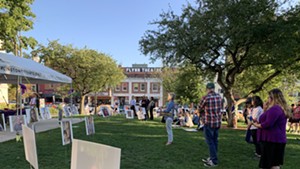
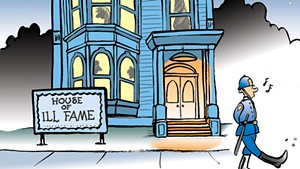

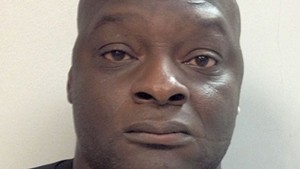










Comments (6)
Showing 1-6 of 6
Comments are closed.
From 2014-2020, Seven Days allowed readers to comment on all stories posted on our website. While we've appreciated the suggestions and insights, right now Seven Days is prioritizing our core mission — producing high-quality, responsible local journalism — over moderating online debates between readers.
To criticize, correct or praise our reporting, please send us a letter to the editor or send us a tip. We’ll check it out and report the results.
Online comments may return when we have better tech tools for managing them. Thanks for reading.